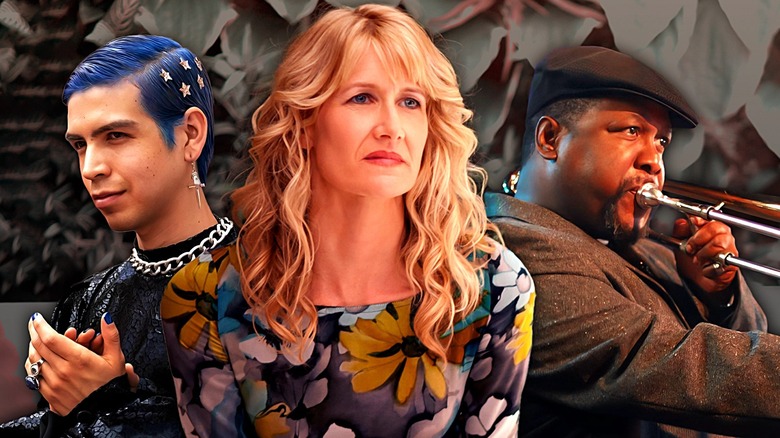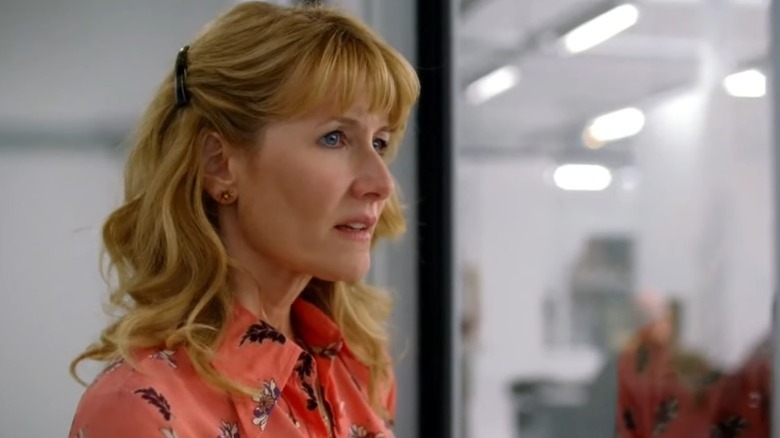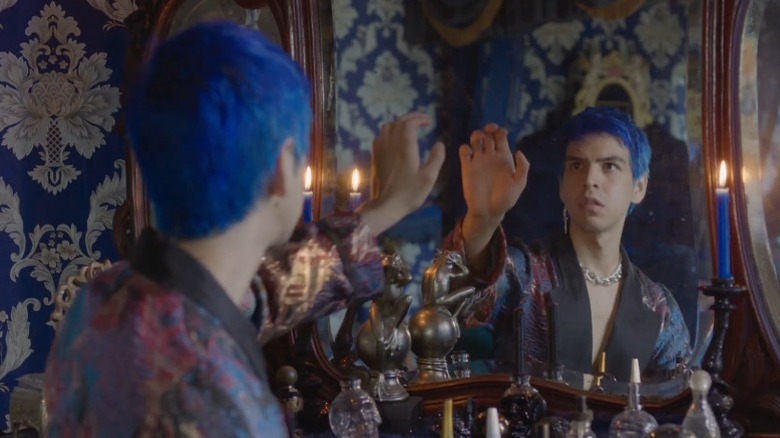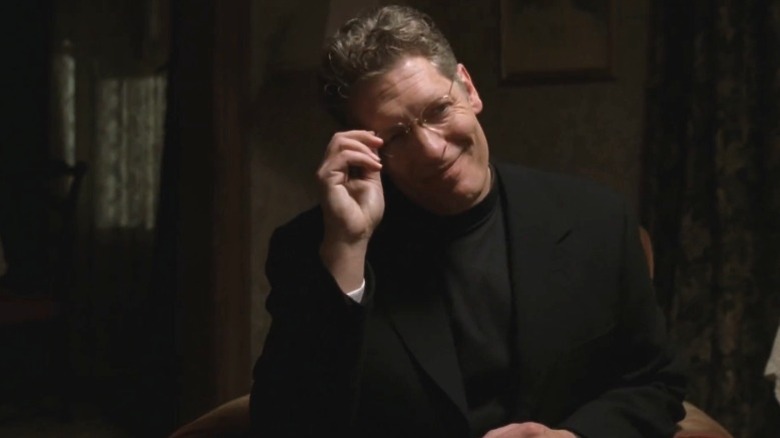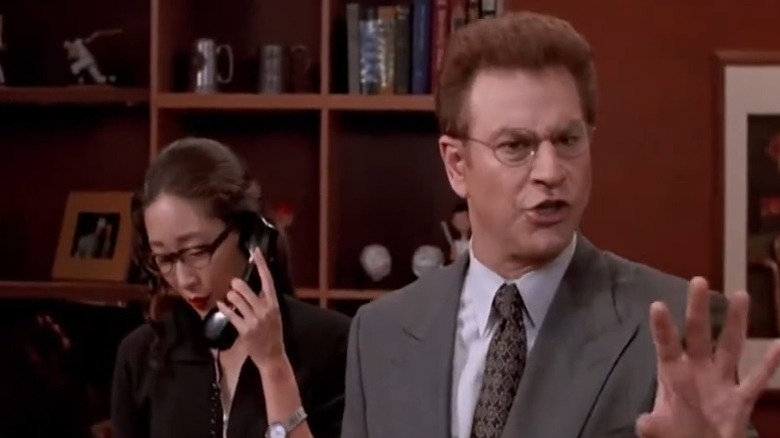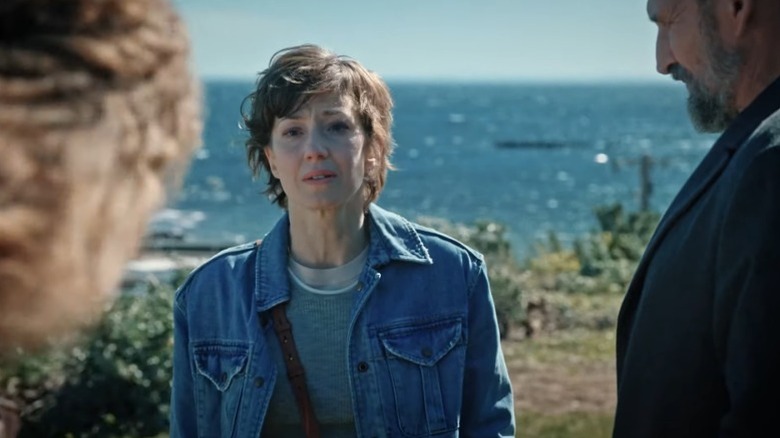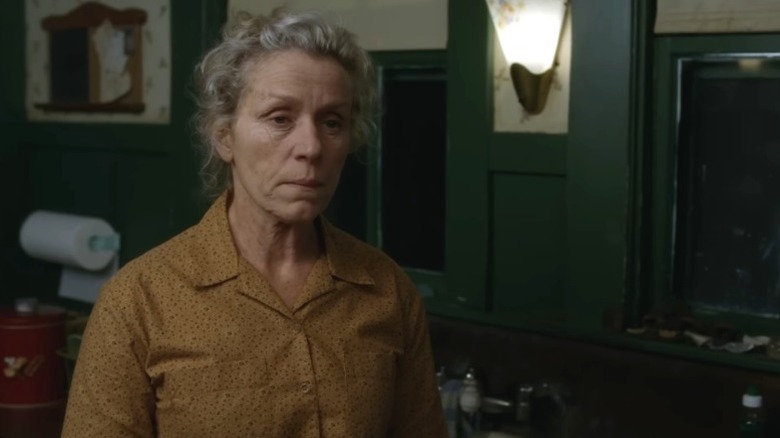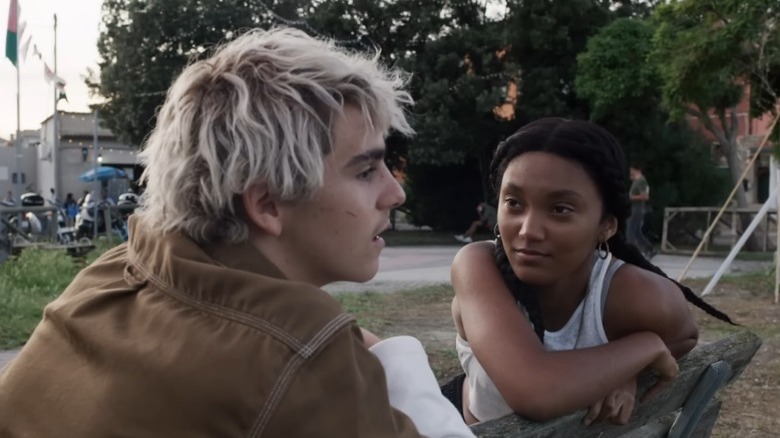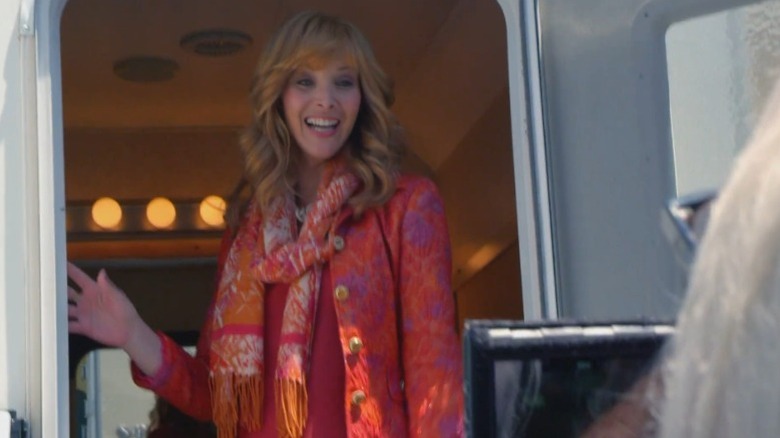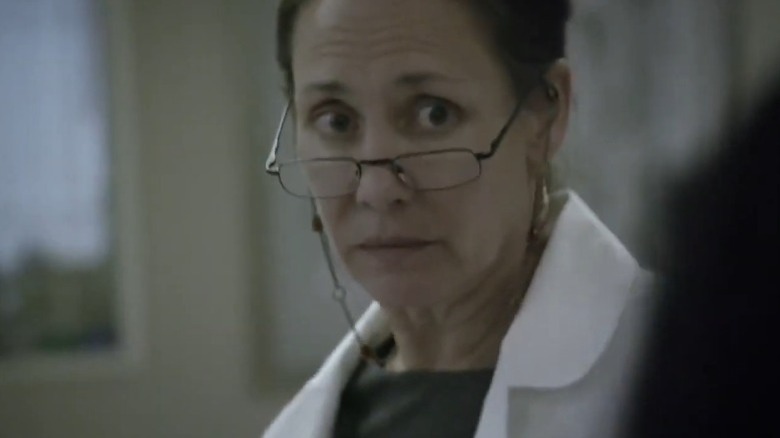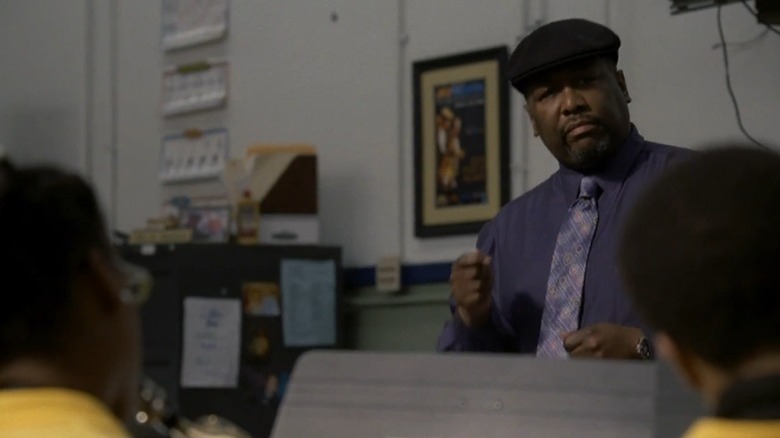The 10 Most Underrated HBO TV Shows Of All Time
We are currently entering an era in which, in a few years' time, given the shifting priorities prescribed by the current management and its single-minded focus on brand expansion and franchise development, the concept of an HBO show may well become something very different in the eyes of the public. So it's as good a time as ever to take inventory of the trailblazing premium cable network's rich history of first-rate television, and remember that artistic ambition and dutiful quality control are what made the HBO brand in the first place, and brought it the cachet and resources required to power megahits like "Game of Thrones" and "The Last of Us."
For one thing, it's not just the hits that matter in this history. Sure, it's easy to think of the "It's not TV, it's HBO" slogan and associate it with cultural lightning rods like "The Sopranos," "True Detective," "Big Little Lies," "Succession," and all manner of other massively popular and award-winning flagship series. But what truly makes HBO, well, HBO is its deep treasure trove of excellent shows that never received that much funfare while they were airing, yet insisted upon their own brilliant, outreaching visions all the same. Several of the shows on this list are beloved enough by critics, or by specific niches of passionate fans, that their description as "underrated" may well take some viewers by surprise. But what they all have in common is helping to shore up HBO's prestige without being showered with the due laurels and public attention. Here are HBO's most underrated shows of all time.
Enlightened
Created by Mike White, who would later find enormous success and snag numerous awards for "The White Lotus" (but also face some controversy over its third season's slow pace), "Enlightened" is maybe the prime example of an HBO series that should be routinely mentioned among the greatest TV works of its time, yet rarely receives the cultural attention it deserves.
Laura Dern — in one of the roles that precipitated her career renaissance in the 2010s — stars as Amy Jellicoe, a fortysomething woman in the midst of a dogged, unglamorous attempt to start living her life in a new way. After having a mental breakdown prompted by multiple overlapping crises in her personal and professional lives, Amy spends two months at a treatment facility where she finds spiritual illumination and a new existential perspective; she then returns to her old life with a new attitude towards love, work, and relationships — and her determination to genuinely better the lives of the people around her begins to wreak havoc.
If that premise sounds like an invitation to self-help drivel, then Mike White has you fooled: "Enlightened" is one of the most brutally honest shows of the 21st century, an anxious, hard-edged, hilariously wry depiction of the fundamental duress of being alive. The show's magic trick is that it manages to probe deep into the question of what it truly means to "self-improve" and "get one's life together" without slipping into cliché or easy sentiment; it's a genuine masterpiece of emotional and psychological storytelling, in which all characters have the depth of oceans under tropical storms.
Los Espookys
Before Julio Torres was taking the indie film world by storm with his surrealist immigration process satire "Problemista" and galvanizing television with the 2024 left-field hit "Fantasmas," he co-created and starred on another, less buzzy HBO series that took similar advantage of his boundless imagination. Alongside the equally visionary Ana Fabrega, Torres was recruited by Fred Armisen to co-develop "Los Espookys," an infectiously passionate and earnest show about horror as a labor of love.
Set in an unspecified Latin American country and told entirely in Spanish, the show aired just two seasons of six episodes each, the first in 2019 and the second in 2022, but those 12 installments were more than enough to establish "Los Espookys" as one of the most original HBO offerings in a long time. Torres and Fabrega star as members of Los Espookys, a service that puts together realistic horror movie-like experiences for customers who want to be scared out of their wits.
Drawing from horror movie history and the rich tradition of Latin American magical realism alike, the show paints the day-to-day grind of Los Espookys as a complex negotiation between their enthusiasm for the craft and the hardships and indignities of running a tiny business — with strangeness, chaos, and absurdism awaiting them at every turn. Given its embrace of the uncanny, the surreal, and the purposefully disorienting, it's the kind of show that probably won't be to everyone's taste, but viewers on the right wavelength should be properly bowled over by the sheer brilliance of Torres and Fabrega's vision.
Carnivale
A show that became so legendary for its lack of appreciation that at this point it's almost hard to think of it as anything but culturally iconic, "Carnivale" nonetheless requires mention on any list of underrated HBO shows. There's an argument for it as the show that best embodies the concept, even, right down to the specific way its brief TV life unfolded: Ecstatic acclaim from critics, befuddlement and disinterest from mainstream audiences, exponentially growing passion from a subset of devoted fans, and a premature cancellation after two prohibitively expensive 12-episode seasons.
What great two seasons they were, though. Created by Daniel Knauf, "Carnivale" can perhaps be best described as a dauntless, financially foolhardy foray into the depths of televisual creativity. Two parallel storylines converge slowly over a carefully-mapped arc full of beckoning, painstaking mythology: One tells of a man from Oklahoma (Nick Stahl) who joins a traveling carnival, the other of an ambitious Methodist preacher in California (Clancy Brown), both during the Great Depression, both marked by an increasing preponderance of the supernatural.
It's a show with dozens of characters, slow-cooking drama, multiple overlapping narratives, world-building and religious symbolism you need charts to follow, and an unrelentingly eerie and dark tone; there's little wonder it wasn't exactly a "Lost"-level ratings phenomenon. But, seen today, "Carnivale" also sticks out, in its relaxed, self-possessed, and utterly spellbinding greatness, as an obvious precursor to every 21st-century genre show that took it upon itself to do things a little more inventively — including several subsequent HBO hits.
Arliss
Before there was "Veep," there was "Arliss," a fellow HBO half-hour comedy that cast a brutally cynical and scathing eye on a world completely different from D.C. politics in many respects, but similarly rotten and horrifying behind the scenes: Top-level professional sports.
Created by Robert Wuhl after reading Donald Trump and Tony Schwartz' "The Art of the Deal" and doubting its veracity, "Arliss" stars Wuhl himself as Arliss Michaels, the wealthy and powerful yet dithering and spineless president of a Los Angeles sports agency with several star clients in its portfolio. Aided by associates including retired footballer Kirby Carlisle (Jim Turner), uptight accountant Stanley Babson (Michael Boatman), and most importantly hypercompetent personal assistant Rita Wu (Sandra Oh), Arliss bumbles his way through PR crises, million-dollar deals, and underhanded business maneuvers — always looking out dutifully for himself and his own pile of money.
A time capsule of the rude awakening from the waning capitalist optimism of the '80s and '90s, "Arliss" has plenty of insider fun with its pro sports milieu, complete with frequent cameos from every '90s American sports superstar you could name. But its true staying power lies in the clear-eyed, deliciously blunt way it skewers a national culture of amoral greed and selfishness, while still having plenty of fun with the sitcom-esque misadventures the staff of Arliss Michaels Management gets up to on a daily basis. In some ways, it was a show way ahead of its time, which may be why even at seven total seasons it's not always rightly remembered among HBO's most formative productions.
The Leftovers
Created by Damon Lindelof and Tom Perrotta, "The Leftovers" started out as an adaptation of Perrotta's eponymous 2011 novel, with a gloomy, abrasive, deliberately frustrating first season in 2014 that gave properly funereal charge to the premise of a world in which 2% of the human population suddenly vanishes into thin air without explanation. Then, on Season 2, having decisively left the book behind, "The Leftovers" opened itself up, relocated from (fictional) Mapleton, NY to (fictional) Jarden, TX, introduced a whole new set of characters to its main cast, and became one of the greatest television shows of all time.
Somehow, even as a unison of critics and few but devoted viewers formed to announce Lindelof's follow-up to "Lost" as one of the most brilliant, moving, daring, maddening, existentially profound audiovisual works of the decade, "The Leftovers" never became the hit it deserved to be, and wrapped up in 2017 with just three seasons and zero above-the-line Emmy nominations under its belt. If too much of the world missed out on its genius, though, it's the world's loss: With its raving, darkly funny, epic yet expertly episodic tales of people adrift in a sea of unassailable grief and spiritual confusion, "The Leftovers" left an indelible mark in the hearts of everybody who watched it. And future HBO mainstay Carrie Coon, playing grief-crushed mother and wife Nora Durst across an endlessly surprising and altogether stunning three-season arc, is somewhere in the conversation for greatest television performance of all time.
Olive Kitteridge
The word "underrated" feels almost strange to place upon a miniseries that won eight Primetime Emmys and swept the miniseries field near-clean, but the fact of the matter is that Lisa Cholodenko's "Olive Kitteridge" just doesn't get brought up as often as it should be by HBO fans among the network's greatest one-and-done affairs ever — even though it's firmly in the same tier as "Angels in America," "Chernobyl," "Band of Brothers," and anything else you could name.
Written entirely by Jane Anderson and directed by Cholodenko with earthy, deeply cinematic grace, "Olive Kitteridge" adapts Elizabeth Strout's eponymous 2008 collection of interlocked short stories, structuring it more firmly around the character of Olive Kitteridge (Frances McDormand) — a cynical and weary schoolteacher in the fictional seaside town of Crosby, ME. Hovering between Olive, her husband Henry (Richard Jenkins), and various other characters who pass through their lives in significant ways over the course of several decades, the four-part series offers an unvarnished mosaic of humanity at its most melancholy and embattled.
True to the novel's spirit, each chapter is its own mini-masterpiece of poetic, observant storytelling, devoid of platitudes or histrionics yet enormously moving thanks to the performances of a flawless cast also including Cory Michael Smith, Zoe Kazan, Ann Dowd, Jesse Plemons, John Gallagher Jr., Rachel Brosnahan, Peter Mullan, and Bill Murray. Watching "Olive Kitteridge" feels miraculously akin to living out years of life alongside Olive and Henry, sharing their burdens and joys and regrets, alternating with them between hard-won wisdom and reiterated confusion about the strange world we live in.
We Are Who We Are
If "Olive Kitteridge" counts as an underrated miniseries even though it received significant awards attention, then "We Are Who We Are," which had zero Emmy nominations despite significant cinematic pedigree and lush production values, is in another category of "underrated" altogether. The eight-part Italy-U.S. co-production was written by Paolo Giordano, Francesca Manieri, and Luca Guadagnino, and directed entirely by Guadagnino as a prickly and fascinating entry in his acclaimed filmography.
Set on a fictional U.S. military base in the Italian coastal town of Chioggia in 2016, "We Are Who We Are" is a languid coming-of-age tale about the freedom and uncertainty of youth. Its two main characters are teenagers Fraser Wilson (Jack Dylan Grazer), newly arrived from New York City to Chioggia with his mothers (Chloë Sevigny and Alice Braga), and Caitlin Poythress (Jordan Kristine Seamón), Fraser's new neighbor, who's been in Chioggia with her parents for years.
The two 14-year-olds bond in profound ways over the course of the show's eighth episodes, each exploring in their own way the complicated and galvanizing corners of identity, morality, politics, gender, and blooming sexuality. Guadagnino films their adventures with the same combination of sun-baked immersion and exacting psychological focus that he routinely brings to his features, creating a sweeping yet delicate portrait of generational woes that, in a just world, would be widely celebrated as one of the single savviest and most empathetic works of media yet made about Gen Z's experience of the world.
The Comeback
There's a strong case to be made for Lisa Kudrow as the "Friends" alum with the most artistically interesting post-"Friends" career, and one fascinating HBO comedy series is a prime example of the kind of bold swing into which Kudrow has routinely parlayed her name recognition in the past two decades. A highly meta affair, "The Comeback" was created by Kudrow herself alongside "Sex and the City" executive producer Michael Patrick King. The series follows the story of Valerie Cherish, a once-popular '90s sitcom star who gets cast on a new sitcom after a decade away from the limelight, and agrees to unveil her changing behind-the-scenes life on an invasive, exploitative reality show.
Each of the two seasons of "The Comeback" constitutes its own singular event within the world laid out by that premise: Season 1, which aired in 2005, is presented mockumentary-style as a season of the show-within-a-show, also titled "The Comeback." Season 2, meanwhile, aired in 2014 and is made up of the footage of Valerie's life that she begins to assemble for a reality TV pilot, later repurposed into an HBO behind-the-scenes documentary for a new show on which Valerie gets cast. Those Charlie Kaufman-esque pretzels of recursive self-referencing and self-mockery might give you an idea of the series' peerless, perpetually underdiscussed brilliance: Led always by Kudrow in a brazenly hilarious performance, "The Comeback" satirizes the TV business with the sharpness and confidence of insiders throwing it all out there. And there's a third season scheduled for 2026, so now's as good a time as ever to give it a go.
Getting On
One of the most underappreciated medical shows of the 21st century is "Getting On," a three-season HBO dark comedy series that aired between 2013 and 2015 to strong reviews and continually low ratings. Adapted by Mark V. Olsen and Will Scheffer from the eponymous British series, with Olsen and Scheffen writing all 18 episodes across the three seasons, "Getting On" is set in the derelict Mount Palms Memorial Hospital in Long Beach, CA — specifically in the hospital's extended care ward, where head of medicine Dr. Jenna James (Laurie Metcalf) and nurses Dawn Forchette (Alex Borstein), Denise "Didi" Ortley (Niecy Nash), and Patsy De La Serda (Mel Rodriguez) deal with the ward's exhausting daily round.
A central trio made up of Metcalf, Borstein, and Nash would, of course, be reason enough on its own to give any show a go. But, more than an opportunity to watch three of TV's greatest character actresses do their thing, "Getting On" offers one of the strongest cocktails of tragedy, humor, bitterness, and warmth you'll find anywhere in the HBO catalog. Modest in scope but expansive and thorough in the execution of its ambitions, it's a phenomenal showcase of what medical fiction can accomplish at its most attentive and imaginative: A panorama of real, believable human beings working their way through physical and psychological pain as best they can, with the mischievous levity of much of the comedy both offsetting the drama and helping to push it towards bold, disarming places. And, yes, the lead actresses are all fantastic on it.
Treme
A wide, novelistic city chronicle of the sort that David Simon specializes in, "Treme" did not enjoy the level of seismic prestige and critical ubiquity that Simon's "The Wire" did some years prior, but it is unmistakably a show born from the same sharp-eyed, deeply generous sensibility. Co-created by Simon and Eric Overmyer, "Treme" takes place in New Orleans in the aftermath of Hurricane Katrina, following the efforts of a colorful array of residents to rebuild their city and their lives.
Like many a Simon production, it's a show with a positively epic cast, following upwards of 30 regular and recurring characters across its four seasons and 36 episodes. Also in typical David Simon fashion, each of those characters is given room to be fully alive and fully human, contradictions and all. The show doesn't play coy about the brutal and heartbreaking reality of the post-Katrina landscape, including the waning interest of the rest of the United States in offering any substantive help to the Big Easy. The loving but grounded and de-exocitizing depiction of New Orleans, meanwhile, is its own treat, and makes for some of contemporary TV's most transporting moments whenever "Treme" allows itself to just bask in the city's vibrant musical and culinary culture (with contributions from Anthony Bourdain) and in the sense of community that prevailed through those hard times. All told, it's one of the most moving, artful, perceptive, and exuberant dramas that HBO has ever aired, even if it doesn't get brought up nearly often enough in discussions of the network's historical high points.
